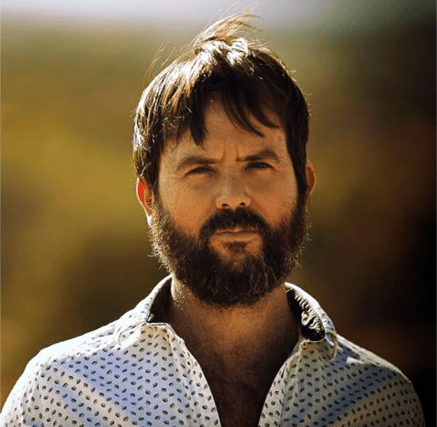From cult comedy icon to cannabis advocate, Jason Gann has taken an unconventional path through entertainment and enlightenment. In this candid interview, Gann opens up about his deep spiritual connection to cannabis, his journey through mental health challenges, and the creative spark that led to Wilfred—the dog-suited philosopher who became a global phenomenon.
We also chat about his upcoming documentary, The Cannabis Code, where he dives into the hidden history and spiritual side of cannabis in a way that’s as eye-opening as it is personal—and timely, as global cannabis culture continues to evolve.
An Interview with Jason Gann
When were you first introduced to cannabis?
My sister gave me a joint when I was 15. I can’t say that I really felt the magnitude of its effects until I was a couple of years older.
How has cannabis positively impacted your life?
It has saved my life. I believe I have a spiritual relationship with cannabis. I’m a big God guy, and I think that cannabis and God are very closely connected. I don’t know how I would have gotten through some of the depths of despair caused by my depression.
I’ve devoted my life, in part, to helping end global cannabis prohibition in any way I can, because I think it’s tragic that so many people around the world are suffering unnecessarily without access to it. It’s such a sad situation where there are people on this planet right now who can’t access it and are suffering unnecessarily.
Are you a dog lover?
Yes. People are always surprised to learn that I used to be more of a cat guy. I always felt dogs were too desperate. But now I’ve got Coco, a black Labrador who’s been with me for several years, and she’s completely stolen my heart.
What inspired you to create Wilfred originally, and did you ever imagine it would evolve into an American adaptation?
The motivation to make a short film with Adam Zwar was born from us being actors and wanting to build careers for ourselves. We saw the short film festival circuit as exciting, and we could see the progression from people doing short films to having successful careers.
We didn’t know we were going to make Wilfred at that point. It was just one of those ideas that came about very organically. It wasn’t from the writer’s room; it was just from conversations, and we wrote it within a couple of minutes of improvising it. The first short film was improvisation, then we wrote it into a script and shot it the next week—and it just kept going.
I did think it was definitely worthy of being a big world hit. Where I felt it fell off was that Adam and I were essentially kicked out of the editing suite by the producers for the Australian version of Wilfred. There was a clash with the directors. I thought the Australian version was far too slow—a missed opportunity at the time. But you know, where there’s a Wilfred, there’s a way!
Did I think it would become an American show? I thought it should have been a hit in America. I just didn’t think the Australian show had the legs to take it there. But the American show, once it happened, just became what it was always meant to be.
Was the tone shift between the darker Australian Wilfred and the more existential American version intentional — or a reflection of your own mindset at the time?
I didn’t want to do Wilfred again after the Australian series. I had reservations, but then they said they would cast someone else if I didn’t want to do it. The actor in me didn’t want someone else to play Wilfred.
In Australian television, everyone goes to exhausting lengths to make a point on set that there are no stars, everyone is treated equally. I went to America, got my own trailer, everyone was calling me Mr. Gann, personal transport, treating me like someone special for creating the show. That definitely echoed into my performances.
You formed a connection with Robin Williams. Is there a moment you shared that stands out to you?
Oh yeah. I probably have about four or five. The first time we met, it was still dark, a beautiful early morning at a ranch out in Malibu Canyon. The crew was setting up the set. He was talking with someone and having a coffee. Our eyes met, we began to walk toward each other, and I reached out my hand and said, “It’s an honour.” He replied, “The honour is mine.” It was like being punched in the chest by an angel—it actually knocked the wind out of me, and I remember letting out a little gasp.
It all came about when Elijah [Wood] and Robin were promoting Happy Feet 2. Robin told Elijah that he and his wife were big fans of the show and would be willing to come on it.

The Cannabis Code: A Spiritual Quest
The Cannabis Code documentary is an investigative journey aimed at destigmatizing cannabis use and advocating for global cannabis legalization. It explores the hidden history of cannabis, potential celestial origins, and the plant’s role in ancient cultures, healing, and religion. Featuring interviews with scientists, historians, artists, and philosophers, it also highlights cannabis’s influence in sports, music, and the pharmaceutical industry.
Suicide prevention is close to your heart. Does The Cannabis Code explore cannabis and mental health?
Yeah, it’s at the heart of it. It’s my pursuit for some kind of spiritual salvation—my quest for knowledge on the spiritual benefits of cannabis and its true genesis. I was diagnosed with borderline personality disorder many years ago and had PTSD from early childhood trauma, along with addiction problems.
>
I ended up going into recovery and began sobriety from alcohol and other drugs. I also took a long break from cannabis. But I always felt that cannabis was different. I told my therapist after a couple of years of sobriety that I felt like I had a spiritual relationship with cannabis and that it was calling me back.
>
I began reconnecting with it—and I discovered all these ancient cultures, civilizations, and religions that used cannabis as an entheogen, as a connection to a higher power. I also had some experiences with extraterrestrial phenomena back in 1998. To me, being part of this genesis story is not a stretch. I realized other people need to know about this too—that’s where The Cannabis Code began. I’ve been developing it for 10 years.
What’s one thing you’ve implemented in your life after filming The Cannabis Code?
I was talking with a self-described shaman from a cannabis church who described the ceremony experience with cannabis. The person about to go through the experience actually speaks to the plant in silent prayer beforehand—setting an intention.
If you come home stressed from work, for example, you might say, “I don’t want to think about work. I want to relax and watch a film,” or, “I want to have a creative session.” Well—it happens. You’re creating a dialogue with the plant.
That’s something I implement now. I take a moment, say, “Hey, this is the experience I want to have—help me out.” And it works. There’s a spiritual side to all plants, and The Cannabis Code digs into this idea—that plants may be sentient beings, possibly even more intelligent than we are.
Cannabis is food, clothing, construction, medicine—and potentially a spiritual conduit. It’s an amazing thing.
Rapid Fire Questions with Jason Gann
Which role have you enjoyed most — actor, writer, producer, entrepreneur, musician, activist, or politician?
Writing.
If Wilfred wrote a self-help book, what would it be called?
Dog Bless.
What’s the best piece of life advice Wilfred gave Ryan?
Keep digging.
What did you miss most about Australia while living in America?
Now that you’re back in Australia, what do you miss about the U.S.?
The feeling of freedom. I feel like this is a really oppressive society here. It makes me claustrophobic.
Favourite munchies snack?
Chocolate.
Stay tuned for updates on The Cannabis Code — follow Jason Gann on Instagram at https://www.instagram.com/wilfred/.


